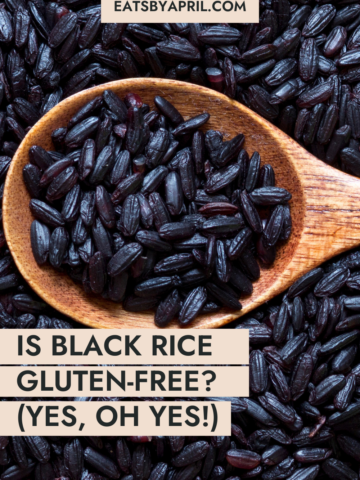There are certain signs that you may be gluten intolerant.
And they're pretty clear. Let's start with a few classic ones. We've got:
- Painful bloating
- Non-stop reflux (you know - the burps, the burning in your throat)
- Stomach or abdominal cramping
- Nausea that won't let up
Of course, that's just to name a few. There's others too.
For me?
I had all of these before I found out gluten was causing all my problems.
But there are other signs you may be gluten intolerant that aren't so clear.
Do you ever eat something and then have bloating or have to be in the bathroom for a while and think, we'll it coulda' been anything I ate!
But you're suspicious it's not just "anything"...and your suspicious are probably bang on.

Think you might be gluten intolerant? Here are 7 sneaky signs to look for:
- Depression
Researchers have found some people experience mood changes and anxiety after eating gluten. No one really knows why, but studies suggest a strong correlation between gluten and depression. - Brain Fog
Do you ever have trouble concentrating, focusing, and thinking clearly at times? Wait..what was I saying. (yeah exactly.) It's got a name: "brain fog." Studies show that it is a common symptom, occurring in 48% of gluten-sensitive individuals. - Headaches
Ever wonder where that pounding headache comes from that makes you down 2 Advil with your coffee? You could be gluten sensitive. Studies show that gluten intolerant people are prone to migraines. - Joint Pain
Feeling aches and pain in your joints and muscles even though you didn’t work out for well, a while? For gluten-sensitive individuals, gluten can cause inflammation, affecting the muscles and joints. - Fatigue
Did you get enough sleep but still feel tired all the time? Ugh. This was so me. Fatigue and dark circles under my eyes that needed THE MOST eye concealer. Feeling tired all the time is actually a pretty common symptom in people with gluten intolerance. - Skin Rash
Are you noticing sudden occurrences of rashes, acne, and dry skin? You’re not alone. Many people said that they suddenly experienced eczema-like rashes and even psoriasis as a result of eating gluten. - Bloating
It’s not uncommon to feel full, swollen, and gassy after eating. But if you feel this way even though you didn’t eat a lot, it may be a result of eating gluten.
If you have one or more of these signs you may be gluten intolerant.
So what is Gluten Intolerance?
It's a newer condition but gluten intolerance is definitely a real thing.
Officially, it's called: Non-Celiac Gluten Sensitivity (NCGS).
The term "gluten sensitivity" also gets tossed around too.
But all three terms are different names for the same thing.
Gluten intolerance is a condition in which you have intestinal and extra-intestinal symptoms after eating gluten.
Ok, sounds straight forward enough - but how is this any different from celiac disease (CD)?
First of all, you may experience similar symptoms to those with celiac disease, but you don’t test positive for CD (using the gold standard of a biopsy of the intestinal lining.)
Plus, with gluten intolerance, you don't have the intestinal damage from gluten and it doesn't involve the immune system, like celiac disease does.
How is gluten intolerance diagnosed?
There is no definitive diagnosis for gluten intolerance (boo.) I should say, there's no definitive diagnosis for gluten intolerance - so far!
Researchers are working on figuring out which biomarkers and other non-invasive tests that point to gluten intolerance.
For now, the treatment confirms the diagnosis. Which means, you cut out gluten and if you feel better, then you can be fairly certain you have gluten intolerance.
How to Treat Gluten Intolerance:
So, you bet your bottom gluten-free cupcake that you're gluten intolerant? Uhhh, now what?
First things first: get a hold of your diet!
When I was diagnosed, I was all over the place with my food (and I'm a dietitian for crying out loud!)
Not only that, I was a "fair weathered" gluten sensitive person...which basically means I cut out gluten when it was convenient for me.
- Eating out? No problem, I can have some pasta.
- Party? Yes! I do eat pizza. Normal pizza, like a normal person
- BIRTHDAY PARTY CAKE. Uh yah. I'm in
You get the picture.
But now, I'm all free of gluten and free of gluten intolerance symptoms.
If you want to go gluten free for gluten intolerance, cut out the most obvious sources of gluten first.
Grab my Cheat Sheet: Foods to Avoid for Busy Moms with Gluten Intolerance
After cutting those foods out, the gluten-free recipes on my site will help you put healthy and gluten-free meals on the table every night.
Here's a few to get you started:
Sheet Pan Maple Dijon Chicken and Broccoli Bake
Healthy Taco Salad with Ground Beef and Kidney Beans
Instant Pot Sweet and Spicy Chicken Thighs
Healthy Instant Pot Chicken Tortilla Soup (no beans)
And if you have any questions about how you may be gluten intolerant, check in with your trusted healthcare provider.
~April
Feeling bloated from gluten and need relief now? Preferably yesterday? Check out my next article on How to Relieve Bloating from Gluten in 7 Easy Steps!
And you may also want to check out: How Long After Eating Gluten Do You Feel Sick?
References
Croall, I. D., Hoggard, N., Aziz, I., Hadjivassiliou, M., & Sanders , D. S. (2020, August 28). Brain fog and non-coeliac
gluten sensitivity: Proof of concept brain MRI pilot study. PloS one. https://pubmed.ncbi.nlm.nih.gov/32857796/.
Griauzdaitė , K., Maselis, K., & Žvirblienė, A. (2020, April 11). Associations between migraine, celiac disease, non-celiac gluten sensitivity and activity of diamine oxidase. Medical hypotheses. https://pubmed.ncbi.nlm.nih.gov/32416409/.
Peters, S. L., Biesiekierski, J. R., Yelland, G. W., Muir, J. G., & Gibson, P. R. (2014, April 1). Randomised clinical trial: gluten may cause depression in subjects with non-coeliac gluten sensitivity - an exploratory clinical study. Alimentary pharmacology & therapeutics. https://pubmed.ncbi.nlm.nih.gov/24689456/.
Pomeroy, C. (2016, September 30). How Gluten Can Cause Joint Pain. Arthritis. https://www.arthritis-health.com/types/general/how-gluten-can-cause-joint-pain.







Comments
No Comments